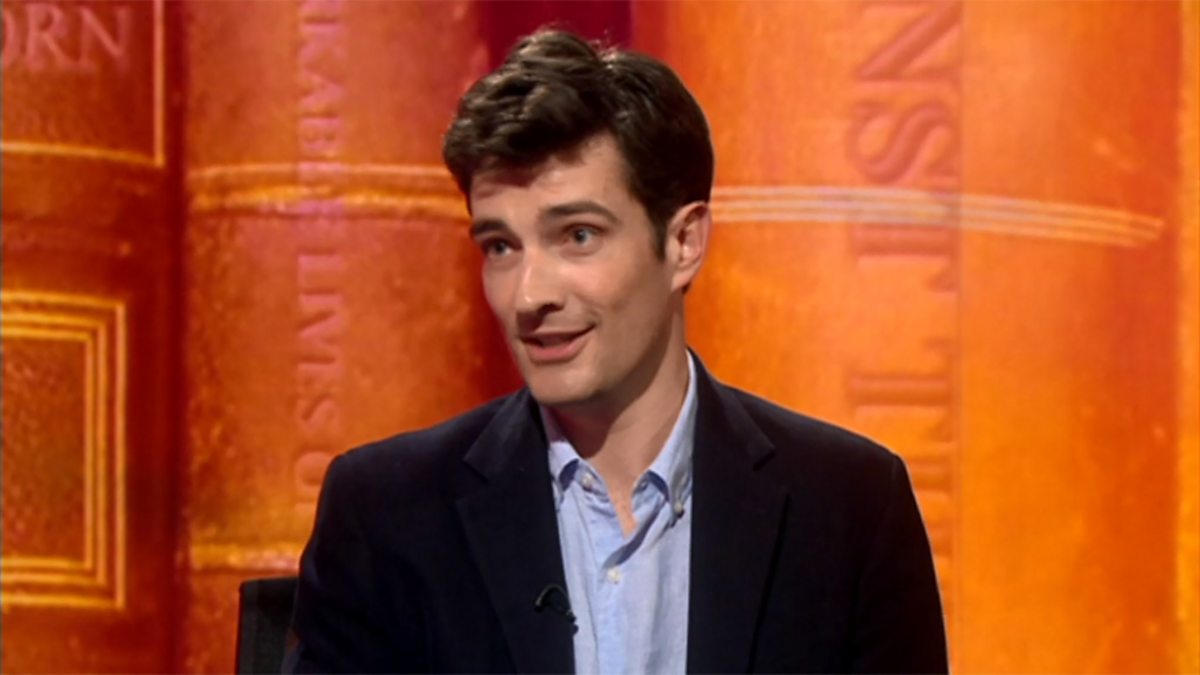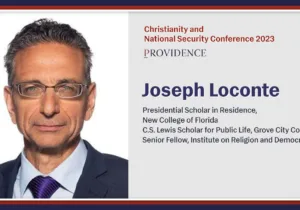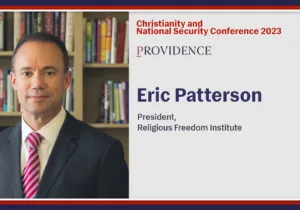Tooley: Hello this is Mark Tooley, editor of Providence: A Journal of Christianity & American Foreign Policy, with the pleasure today of talking to British historian and journalist Tim Bouverie about his book published last year, Appeasement, about British policies towards Hitler and the lead up to World War II, with an application that is not just contemporary but for all time. So, thank you, Tim, for joining this conversation.
Bouverie: Thank you very much for inviting me, Mark. It’s a pleasure.
Tooley: Now the word and policy “appeasement” obviously have a very negative connotation today, but that was not the case in the 1930s originally?
Bouverie: No, and there’s nothing inherently sinister about the word. You see two people having an argument, you want to appease them. You see an angry man, you want to appease him, or generally you want to appease him rather than to get into any unnecessary confrontations. And throughout most of the 1930s, it simply meant the readjustment of what was widely considered to be unjust terms of the peace settlements that has ended the First World War. The British, and to a far less extent the French, but the British in particular, had become fairly convinced across the political spectrum by the early 1930s that the Versailles Peace Treaty had been too harsh, and therefore, that some of what Hitler was asking for was not in itself unreasonable.
Tooley: Now for most people, especially Americans, appeasement is intertwined with the name of Neville Chamberlain, but it was a policy involving many more personalities than just Chamberlain and as you say, in effect expressed almost a consensus level of opinion in Britain in the 1930s. Correct?
Bouverie: Yes. It became less consensual as the decade wore on. Almost everybody, in fact, everybody in person, would like to have avoided a second world war. There is unanimity on that from Neville Chamberlain, on the one hand, to Winston Churchill, on the other. The disagreement is about how to avoid it. In his famous history of the Second World War/part memoirs, Churchill talks about him having a conversation with Franklin Roosevelt in which the president asked what the war would be known as. Being as the First World War at that stage was known as the Great War, what is this new war we’re engaging in going to be known as? And Churchill said it should be known as the unnecessary war, for never was there a war more easily stoppable. Now, that few people entirely agree with. It was not easy to stop Hitler. It may not have been possible to have stopped Hitler without a war. And so, the disagreements both then and now come much more down to at least trying to stop him earlier, or if there had to be a war, trying to precipitate it as a moment when Britain was at her maximum strength diplomatically, as well as militarily. Which could have meant going to war in 1938. But yes, everyone wanted to avoid war. Lots of people felt that it was no concern of Britain’s, or if they were in the United States, they didn’t think it really mattered what happened in Eastern and Central Europe. If these parts of the world had ethnic Germans in their lands which wanted to join with the greater German Reich, then so be it. The problem was that every time Hitler initiated one of his crews, it was merely the jumping off point for the next one. And there was, this becomes this huge fundamental question of when is he going to stop? Is he simply trying to incorporate all of the ethnic Germans within the Reich, or is he trying for something more akin to European, and eventually world, domination? And if it is the latter, then it is necessary at some stage to stop him. And the question becomes, when are you going to stop it? And do you realize this whole thing too late when you have lost your allies, more countries have been taken over, and your prestige in the world, and prestige really mattered then in a way that tragically it doesn’t now, it’s hard to think of, the West has lost so much prestige. Britain has lost so much prestige. I’m very sad to say that, in many ways, the United States has lost, certainly lost, international prestige. But in previous decades, and in very recent decades, the United States had great prestige in a way that is similar to the way that Britain had prestige in the first part of the 20th century. This was a powerful empire that was considered to stand by its allies, stand by its friends to defend the weak against new dominating and totalitarian power.
Tooley: Some have tried to defend Chamberlain as strategically playing for time as Britain rearmed, but your book would seem to rebut that case in that Chamberlain seemed to actually by conviction believe that Hitler could be successfully appeased.
Bouverie: Indeed. It’s a completely ahistorical argument that Chamberlain bought time at Munich. “Well, that’s what he was trying to do.” There were people in Britain who thought that Britain was not ready for war in 1938 and that if it could be delayed, that would be better. And that’s totally fine. But that was not what Chamberlain thought. Chamberlain genuinely believed that he could come to a modus vivendi with Hitler. He genuinely believed that he had indeed reached this modus vivendi with Hitler at the Munich Agreement. He believed Hitler when he said that this Sudetenland was the last territorial demand that he was going to make. And he believed him when he signed that famous piece of paper that he waved at Heston Aerodrome in late September 1938, stating that these two countries were never going to go to war again. And the proof of this is shown, not only in the fact that his closest advisors both later attested to the fact that he genuinely did believe he had brought back peace with our time, but also in the fact that in the immediate months after the Munich Agreement, Chamberlain does not seriously increase, step up, or expand the British rearmament program. He believed that he had secured peace. Therefore, it is not a breathing space. British rearmament gets a further injection of funds and impetus the following year in 1939 and at the insistence of other cabinet members, but Neville Chamberlain really did believe that he had triumphed at Munich.
Tooley: Chamberlain had not been an incompetent man. He had a long and successful career as a parliamentarian, as a mayor, I believe, from a distinguished political family. So, what was it about his personality, character, political philosophy that led him to this unique and cataclysmic naiveté about Hiller?
Bouverie: Well, the old joke, which was made by the First Lord of the Admiralty Alfred Duff Cooper, was that Neville Chamberlain had never met anyone in his life who in the least resembled Adolf Hitler. Which is true. He couldn’t have been, Hitler, a more different man to Neville Chamberlain. Except for the fact that they both had a strong distrust of professional diplomats and their own foreign offices, and liked to conduct their own foreign policies away from the professionals. Neville Chamberlain found it very hard to believe that anyone could genuinely want war. And Adolf Hitler was one of the only people in the world, apart from certain members of the Japanese Military certain did want to expand conflict, but generally, most people in the world did not want a second world war. This was truly a policy initiated by the few to the detriment of the many. And Neville Chamberlain particularly couldn’t understand why Adolf Hitler would want a war, when he believed that it was entirely possible for him to achieve his goals without one. That it was possible to acquire the Sudetenland without a war. That it would possibly be possible to acquire the bits of Poland which had been taken from Germany at the end of the First World War. But the problem was that this wasn’t all that Hitler wanted. He wanted more. He wanted an empire in Central and Eastern Europe. Lebensraum. He believed increasingly that it was necessary for Germany to facedown Britain and France. Two countries he described in 1937 as hate-filled antagonists. And it wasn’t that there weren’t lots of warnings of this. I mean, to answer your question directly, it’s a combination of arrogance and wishful thinking. The arrogance, I believe, comes from the fact that Neville Chamberlain was, as you say, a very successful politician. And this hubristic trap which he fell into is by no means unique to Neville Chamberlain. Winston Churchill fell into it with Stalin. Franklin Roosevelt fell into it with Stalin. It goes on and on and on. And one could continue to talk about it with President Trump and Putin, or President Trump and Kim Jong-un. Politicians who have reached the very top, are very successful, by definition, they have persuaded a lot of people that they should be the leaders of their country. They persuaded their party. They persuaded their colleagues. And finally, they’ve persuaded the electorate. They’ve done this through a combination of political skills, including persuasion, and charm, and strong-arm tactics. They then find it very hard to believe that these same amazing political talents that they possess don’t work internationally, or that they cannot have the same effects internationally. But they can’t because all these international statesmen have their own priorities. They have their own national priorities. And it was naive of Neville Chamberlain to believe that Hitler who, firstly, was innately unclubbable. He was never going to be chummy with someone just because he wrote nice letters to him and was friendly with him when they met. But he had an agenda which was wholly at odds with the existing European order and ultimately the security of Great Britain. Just as it was naive of Churchill and Roosevelt to believe that just continued face-to-face time with Stalin, and treating him with respect, and making various concessions to him during the Second World War as the war began to wind up would stop him from communizing Eastern Europe. Stalin had a very, very clear national ideological agenda, and whether he got on with Roosevelt and Churchill or not didn’t really matter.
Tooley: Often American foreign policy is divided at least theoretically between two schools of thought, realism and idealism. Perhaps you’ve something similar in British foreign policy. Was appeasement guided by a cold realism or was it a soaring unrealistic idealism?
Bouverie: It’s an interesting question. It was an element of both. The element of realism was that people did not believe that the country and the empire could survive another war. I think so much of the ruling British political elites were flabbergasted that Britain had managed to survive so well from the First World War. Admittedly economically ruined, but the Empire had survived, in fact, grown. There had not been a sort of socialist revolution in Britain as there had been in Russia, which was a huge fear. But they didn’t believe they were going to be so lucky next time around. They believed that the old capitalist, and in some ways, still aristocratic order of society could not sustain the pressures of another war. They didn’t believe the country could. Aerial warfare could destroy large cities they believed in totality. And the empire would almost certainly break up. And in all of those things they were quite right. I mean, the destruction of cities was not as bad as they feared. The empire didn’t completely go overnight, but it went pretty quickly. And the government of Clement Attlee, which came in in 1945, although not a revolution, it came through democratic means and was by no means as extreme as anything that happened in other parts of Europe, or certainly not in Russia in 1917, it was a profound change and shift to the left. The nationalization of the economy in major ways, the introduction of a welfare state, these are things which the existing order beforehand did not wish to see. It was idealistic because they wholly had imbibed the spirit of pacifism, which had really grown up after the First World War. And it is an entirely noble thing to not wish to go to war. However, when you are the prime minister of what was still then a great country, in the center of an empire which covered a quarter of the globe, it is your duty to realize that war is a resort. It hopefully is the last resort, but it is a resort. And to loathe it to the extent and fear it to the extent that Neville Chamberlain did was problematic. And it’s one of the reasons why he then also became a very bad war prime minister in the few months between September 1939 and May 1940 when he was prime minister. So, it’s a combination of it. It is certainly, I wouldn’t say it’s idealistic in its dealings with Hitler. There’s no, there’s very little sympathy for Hitler’s character, for his domestic agenda. Neville Chamberlain made jokes in his letters about if only the Jews would get on and assassinate Hitler, life would be a lot easier. They don’t like this man. There’s no real affinity to him. So, it’s not based on idealism. It is more based on a misbegotten idea of realism that somehow something could work out. And even if it didn’t, it’s better than the alternative, which is a horrific war.
Tooley: And then finally, Tim, of course the so-called believed lessons of appeasement have played a major role in guiding how America thinks of its own role in the world over the last eight years, certainly it was instructive in terms of America’s war in Korea, and Vietnam, and later in Iraq. And often America tends to equate its enemies with Hitler. And to see the same drama replaying itself, have the lessons of appeasement been overplayed or an instruction that should always be in our mind as we confront dictators around the world?
Bouverie: It’s a huge question, Mark. But my simple answer is that the lessons of appeasement have not been properly learned. People think they have learned the lessons of appeasement, which is simply, and the two major powers that have pursued this are Britain and the United States, but overwhelmingly the United States since the Second World War. The lesson they believe is that whenever you see aggression or a sinister regime hostile to your interests, you go in as soon as possible, and you take them out. And you prevent the spread of hostile ideologies wherever you can. And that leads you to Korea, to Cuba, to Vietnam. It leads Britain into Suez in 1956, and it leads into Iraq twice. Actually, what I believe the lesson of appeasement is is that the problem with that is that the lessons of appeasement is not an artificial scenario. It doesn’t fit every scenario. The crucial undoing of Neville Chamberlain and his policy was that he misunderstood, or willfully misunderstood, Adolf Hitler and the Nazi regime. This was a regime which was out for world domination. This was a man who could not be trusted. And this was a man who Britain was ultimately going to have to fight at some stage. And the question became when, rather than if. Very few of the other foreign policy generally I would call them to debacles that I’ve just listed, were inherently necessary, and many of them lead to disasters because none of, very few of, the regimes which were operating in any of those places, albeit hostile to the United States and possibly hostile to Britain, they were not of the same existential threat to Western security as the Hitler regime or Imperial Japan was. And indeed, there is a certain irony in the fact that with say somebody like Colonel Nasser and the Suez Crisis of 1956 or Saddam Hussein, these are actually not the strongest or the most dangerous opponents of the West that there are in the world. There were other more dangerous opponents. North Korea could be one. Russia could be another. Iran might in one stage be in there. These were never on the list of potential places to strike. On the country, places like Iraq and Saddam Hussein, who seems to be chosen because although by no means a savory regime at all and by no means a friend of the West, they were not powerful enough to put up much resistance. So, they could be taken out, despite the fact that it could unleash forces in the region, which would claim many more western lives, both in battle and through terrorism than was ever going to have occurred otherwise. So, might the big lesson from a piece and as I believed in Neville Chamberlain’s experience is to understand the regime with whom you’re dealing. The more direct lesson is not everyone does stand up to regimes where it is inherently obvious that they are sinister and antithetical to Western values and Western interests. And I’m thinking specifically of the Putin regime in Russia. And it seems a very odd spectacle in Britain, and one of the few disagreements between Britain and the United States over the last four years, that there has been a regime in Washington and the White House which seems to have wanted to exculpate the actions of the Russian government who are responsible for murders not only in their own country but on the streets of the United Kingdom, who are responsible for the illegal annexation of Crimea, and a proxy war in Ukraine. And when I talked about the lowering of Western prestige, it’s the failure of I think the great, as you’re called, leader of the free world to stand up for freedom against such bullies, while at the same time, often attacking some of your closest allies in Europe that causes disquiet.
Tooley: On that sobering note, Tim Bouverie, thank you very much for an informative conversation and looking forward to your next book.
Bouverie: Thank you very much.








 Live in the DC area? Sign-up for Providence's in-person events list!
Live in the DC area? Sign-up for Providence's in-person events list!